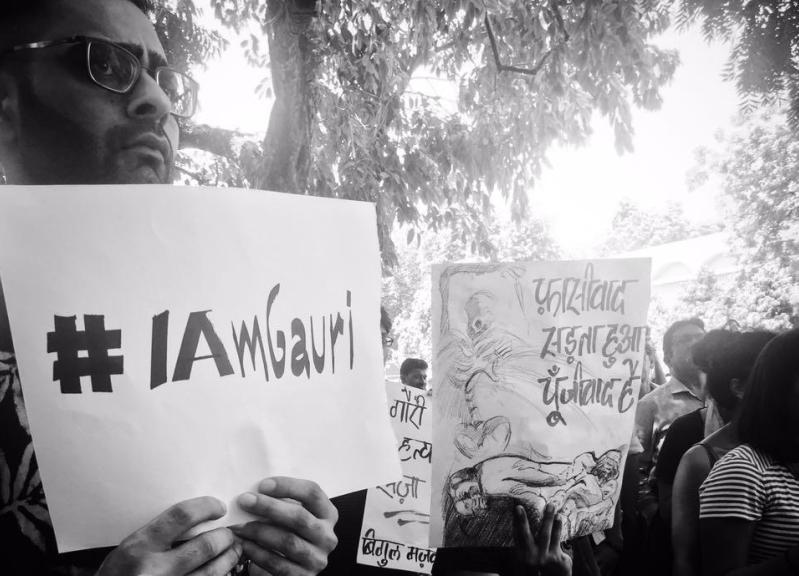Gauri Lankesh's Murder Is Further Proof That We Are On Our Way To Becoming A Hindu Pakistan
MONA AHUJA

I remember shuddering with horror when I read about the murder of Pakistani politician and then governor of Punjab Salman Taseer. Taseer was shot 27 times by his own bodyguard near his house in Islamabad. The horror had more to do with why Taseer was killed. He had been a vocal critic of Pakistan’s blasphemy law, and had spoken in defence of Asia Bibi -- a Christian woman who had been sentenced to death under the controversial law. Taseer’s statements against the religious law had angered the more conservative components of Pakistani society, and at the time of the murder, many of Pakistan’s clerics voiced support for the crime and urged a boycott of Taseer’s funeral. “How could people live in a country like that?” -- I had wondered at the time.
I remember feeling the same sense of horror when Pakistani journalist Sabeen Mahmud was killed. Mahmud was fatally shot by gunmen on her way home in 2015. She used to run the Second Floor (T2F), a cafe cum cultural space in Karachi, known for organising debates and art events. Mahmud was killed shortly after hosting an event on Balochistan’s “disappeared people.”
More recently, in 2016, activist Khurram Zaki was killed in Karachi. A former journalist, Zaki was a campaigner for human rights and the editor of the website and Facebook page Let Us Build Pakistan with the stated aim to "spread liberal religious views and condemn extremism in all forms.” He died as four assailants opened fire at him while he was at a restaurant.
These are just a few cases. Activists and journalists who are critical of the government or the conservative politics of the country are often targeted. Harassed, intimidated, and even killed in cold blood.
Our other neighbour, Bangladesh, too makes headlines for its targeted killings. The list of cases of atheist writers, bloggers, journalists, secularists, gay rights advocates and others who have been targeted by Islamists is endless. Xulhaz Mannan was hacked to death; he was an editor of Bangladesh’s first magazine for the gay community. English professor Rezaul Karim Siddique was hacked to death; the Islamic State claimed responsibility for the attack. Also last year, Nazimuddin Samad -- a secular blogger -- was hacked to death; he had criticised elements of radical Islamism on his Facebook page. The year before, a publisher of secular books was hacked to death, while two other writers and a publisher were stabbed and shot at a publishing house in a separate attack in Dhaka. The same year, prominent blogger Avijit Roy was killed in February. A month later, blogger Washiqur Rahman was killed. Blogger Ananta Bijoy Das was killed in May. In August, Niloy Neel, another secular blogger was hacked to death.
All the above people were killed because they chose to speak out; they chose to dissent with the powers that be -- religious and political. The reason I am bringing above incidents is to elucidate a larger point, which I will just come to…
I was sitting with a friend when news of Mahmud’s murder broke. “How awful,” she exclaimed, when I told her about what had happened. “But what can one expect from a country like Pakistan. They are so darn conservative. I can’t imagine what it would be like to live there…”
I didn’t disagree. I called up the same friend this morning, after news broke of Gauri Lankesh’s murder in Bangalore. Gauri Lankesh was a leading Indian journalist and activist. She was shot to death by unknown assailants outside her home. It is impossible to delink her politics from her murder; she was recently held guilty of defaming two BJP members and her publication was routinely described as “anti-establishment” by many on the right.
“Aren’t you outraged?” I asked my friend. “Why?” she asked. “Because we live in a country where people are getting killed for disagreeing with the establishment, in broad daylight, in cold blood.” “Don’t be silly,” my friend interjected. “You’re jumping to conclusions. It could have been anyone who killed her. India isn’t like that…”
I realised, at that very instance, that India is like that. What’s scarier still is the unwillingness of people -- like my friend -- to see it. It is condemnable when a Salman Taseer gets killed in Islamabad or when an Avijit Roy is hacked to death in Dhaka -- then the conservatism of the country that allowed such a crime to occur is clear to us, and we have no hesitation in condemning it. But when the same thing happens at home, we close our eyes and ears. “It isn’t so,” we conveniently tell ourselves. “India isn’t like that.”
How many Gauri Lankesh’s is it going to take for us to finally call a spade a spade? India is like that, and denying that reality is only making it all so much worse.
How many MM Kalburgi’s is it going to take? How many Govind Pansare’s are going to have to die? How many Narendra Dabholkar will be gunned down? How many Gauri Lankesh’s will be shot before we wake up?



